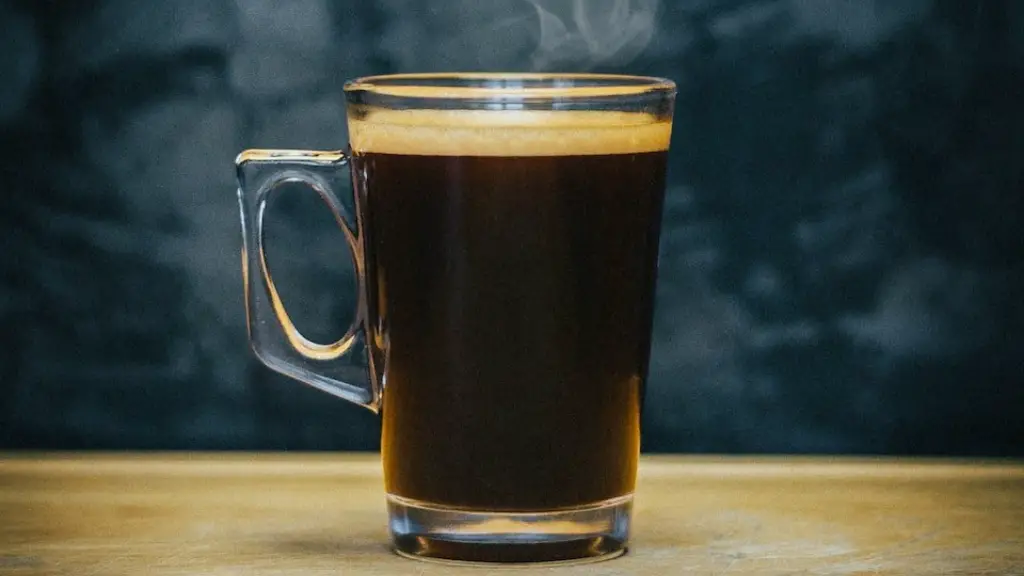High cholesterol can be a major health concern but that doesn’t mean that you can’t enjoy a cup of black coffee. It is necessary to understand the relationship between cholesterol and the consumption of black coffee, as well as the overall effects that different types of coffee can have on the body. Cholesterol is a waxy, fat-like substance which is produced naturally in the human body, although it can also be found in certain foods. High levels of cholesterol can increase the risk of cardiovascular issues, including heart attack and stroke.
Although the jury is still out in terms of what the ideal level of cholesterol should be, the general consensus among experts is that consumption of trans and saturated fats should be monitored and moderated in order to keep cholesterol levels low. High consumption of these fats can lead to an increase in LDL, or “bad” cholesterol, which can be detrimental to overall health.
At the same time, the effects of black coffee on cholesterol levels is still widely debated. While some studies suggest that black coffee is actually beneficial for cholesterol levels management, others indicate that too much of it can be detrimental. Therefore, it is important to consult a medical expert before beginning or increasing your daily intake of black coffee. Furthermore, your diet should also be taken into consideration, as this can be an important factor in the maintenance of healthy cholesterol levels.
When it comes to black coffee and its potential effects on cholesterol levels, it is important to consider that there are many factors that can affect the amount of cholesterol that is found in the coffee. For example, some of the compounds in coffee can bind to the lipids that are responsible for carrying the cholesterol. In addition, the amount of cholesterol in coffee can be affected by the brewing technique, as filtered and instant coffees typically have lower levels than those brewed with French press and drip methods.
Another factor to consider is how caffeine affects cholesterol levels. Caffeine has been linked to elevated blood pressure and cholesterol levels, however, there are conflicting studies about this. The evidence for the link between caffeine and cholesterol is not strong and the results of some recent studies suggest that moderate caffeine intake, such as that found in black coffee, may not have any effect on cholesterol levels at all. In addition, it is important to consider that caffeine may help to increase the absorption of cholesterol from different foods, so it is possible that black coffee itself might not be the primary cause of increased cholesterol levels in the body.
In general, the effects of black coffee on cholesterol levels are still being researched and debated. Given the potential risks and uncertainties, it is important to consume black coffee in moderation. Before increasing your intake, it is important to consult a medical professional and ensure that you are aware of the potential risks and benefits for your situation.
How Black Coffee Affects Cholesterol Levels?
The relationship between black coffee and cholesterol levels is still largely unknown, though it is generally accepted that the compounds present in coffee can interact with lipids in the body which, in turn, can affect cholesterol levels. In addition, the method of brewing coffee can also affect the levels of cholesterol found in the beverage itself. In terms of the overall effects of caffeine, it is still debated whether it can lead to a raise or a drop in cholesterol levels and it is recommended to limit the intake in order to avoid any potential dangers.
How to Monitor Cholesterol Levels in The Body?
The most effective way to monitor your cholesterol levels is to get regular blood tests from your doctor or health care provider. This will enable you to track any changes in cholesterol levels and take appropriate preventative steps, such as changing your diet and lifestyle. In addition, it is important to consider that other conditions, such as high blood pressure or diabetes, can also increase cholesterol levels and therefore, it is important to take extra care in monitoring cholesterol levels if you have such a condition.
Foods That May Help Reduce High Cholesterol
Certain foods can also help to reduce high cholesterol levels, such as omega-3 fatty acids, which can be found in fatty fish, such as salmon. A high intake of dietary fiber, which is found in fruits, vegetables, legumes and grains, can also help to reduce cholesterol levels. In addition, garlic can be effective in reducing the levels of LDL cholesterol, while the consumption of nuts and oats can help to raise levels of HDL cholesterol, or “good” cholesterol.
Are There Any Negative Effects of Black Coffee?
Although black coffee can provide some positive benefits, including a boost in energy and alertness, it is important to note that consuming too much of it can have negative effects, such as insomnia, elevated blood pressure and a rapid heart rate. For this reason, it is recommended to consume no more than 2-3 cups of black coffee per day. In addition, it is important to consider that black coffee can be highly acidic, which can lead to an upset stomach and heartburn.
Should You Avoid Black Coffee If You Have High Cholesterol?
The answer to this question largely depends on the individual’s overall health status. Furthermore, it is important to consider that different types of coffee can have different effects on cholesterol levels and that the method of brewing can also affect the amount of cholesterol that is extracted from the beans. Therefore, it is recommended to consume black coffee in moderation and to consult a medical professional before increasing your intake.


